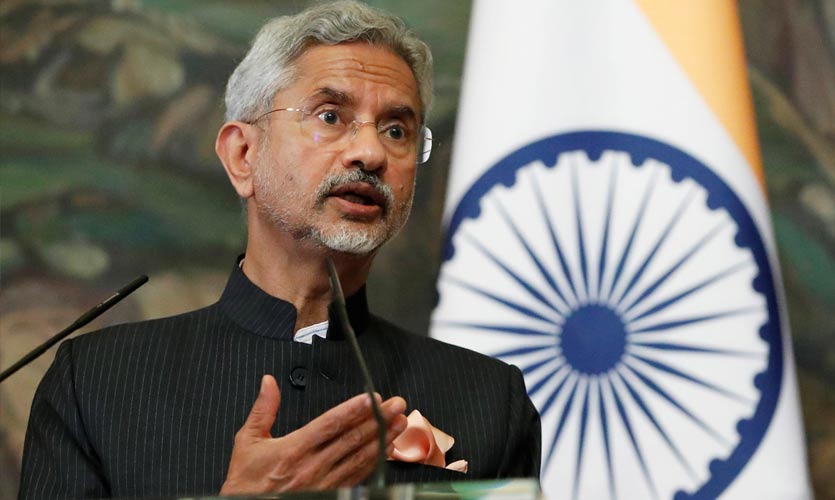India’s External Affairs Minister Dr S Jaishankar, while speaking at the Raisina Dialogue this week, pointed out challenges in Asia and India’s neighbourhood, which comprises China and Afghanistan. He also responded to the questions from European delegates on the crises arising as a result of the Russia-Ukraine conflict.
Norway’s Foreign Minister Anniken Huitfeldt stated during the dialogue that Russia’s aggression was an instance of an authoritarian state attacking a democracy, and asked about India’s role in defending free societies. To this, Dr Jaishankar responded, “You spoke about Ukraine. I remember, less than a year ago, what happened in Afghanistan, where an entire civil society was thrown under the bus by the world. We in Asia face our own sets of challenges, which often has an impact on the rules-based order.” This statement that the whole of civil society was thrown under the bus by the world, referred to the deal that the United States had with the Taliban in 2020 (Doha negotiations), the fallout from which resulted in the withdrawal of the International Security Assistance Force (ISAF) from Afghanistan.
The statement by India’s EAM also reflected the ignorance of world leaders, primarily the US and the Western bloc, who supposedly fought against the Taliban for almost 20 years, and then suddenly left the Afghan people under their brutal regime. The Taliban is now much stronger and is the acting government of Afghanistan, although it is struggling to feed the people and maintain the peace with an increase in Western sanctions and Islamic State (ISIS) sponsored attacks, respectively.
Responding to another question from Luxembourg Foreign Minister Jean Asselborn, Jaishankar said, “If I were to put those very challenges in terms of principles, when a rules-based order was under challenge in Asia, the advice we got from Europe is: Do more trade. At least we are not giving you that advice. And in Afghanistan, please show me which part of the rules-based order justified what the world did there?”
It is not a secret that New Delhi, for quite some time now, has been alleging that the Western bloc has ignored the growing belligerence of China against India and in the Indo-Pacific region, for years.
It is pertinent to note here that Dr Jaishankar, at the Munich Security Conference, in February 2022, had pinpointed, “Principles and interests are balanced and if people were so principled in this part of the world, they would have been practising them in Asia, or Afghanistan before we have actually seen them do.” The minister had made this statement while responding to a bunch of questions on India’s principle on abstaining from voting against Russia at the UNSC and the UNGA.
“This could be a wake-up call for Europe, not just in Europe. It could be a wake-up call for Europe to also look at Asia. This has not been an easy part of the world for the last decade. And this is a part of the world where boundaries have not been settled, where terrorism is still practised, often sponsored by States. This is a part of the world where the rules-based order has been under continuous stress for more than a decade…I think it’s important for the rest of the world outside Asia to recognise this. It’s not that problems are going to happen. The problems have been happening,” said Dr Jaishankar while responding to a question from former Swedish Prime Minister Carl Bildt. He had asked how China was going to respond after watching the global reaction to the Russian invasion on Ukraine.
While speaking at the Raisina Dialogue, Dr Jaishankar also highlighted the consequences of the conflict in Ukraine, which is now resulting in food shortages, inflation, and energy crisis, in various parts of Europe. He said, “There is really nobody who wants to see this conflict. There will be no winners out of this conflict. Our position is that we all have to find some way of returning to diplomacy and dialogue… To do that, the fighting must stop.”
The Western bloc has been pressuring India consistently, to condemn Russia’s military invasion, ever since the beginning of the conflict. While India has been consistent in its approach to stress the importance of dialogue and diplomacy and strive for peace, it hasn’t directly commented against Russian invasion. India has bought more than twice the amount of crude oil from Russia in the two months since its invasion of Ukraine than it did in the whole of 2021, at a discounted rate, much to the dismay of the West. This could also be a key point behind a flurry of European delegates visiting New Delhi to ensure that their ties with India stay intact. Noteworthy, India has condemned the mass killings in Bucha, citing the need to respect territorial integrity and sovereignty at the United Nations forums.
The world is witnessing a reminiscence of the cold war era, with the US and its allies standing in direct opposition against Russia, with China.










